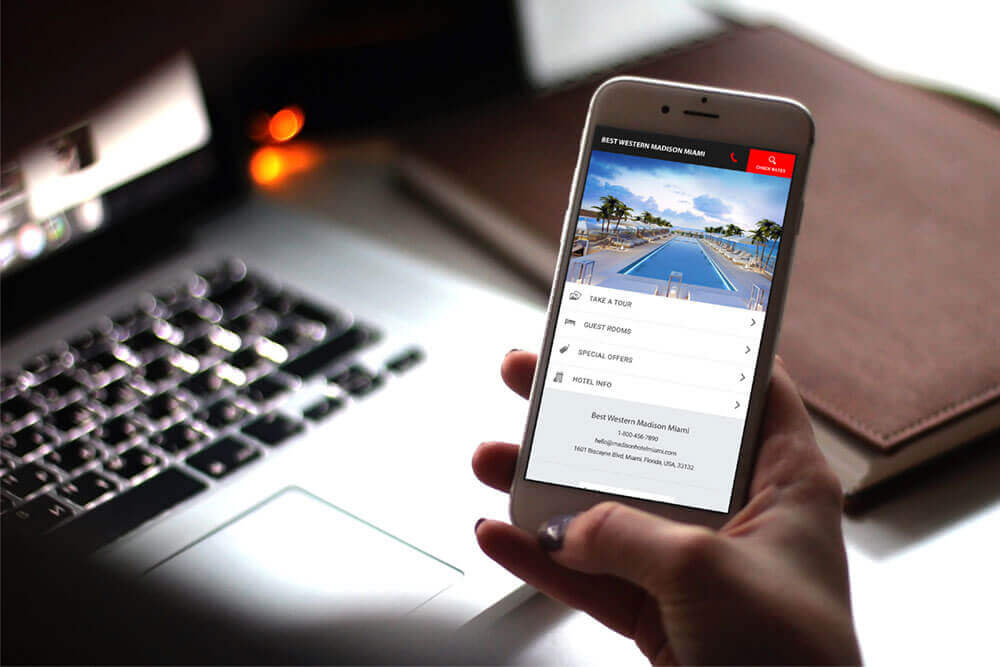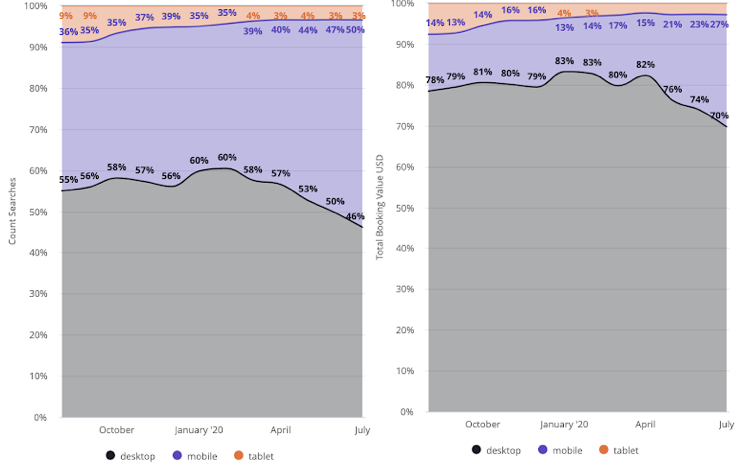
The impact of loading speed on mobile website performance is well documented. A recent Google-commissioned study, Milliseconds make Millions, found that a 0.1 second improvement in loading speed on travel websites increased conversion rates on mobile by 10.1%.
NB: This is an article from Triptease
That loading speed improvement also decreased bounce rates by 5.4%, increased page views per session by almost 3% and resulted in more customers progressing through the conversion funnel on mobile devices.
The report also notes that a simpler mobile experience on travel sites can make it easier for users to make choices when given multiple options. That’s relatively easy to handle on your marketing website. Even if you don’t have in-house design or UX resource, there are plenty of quick fixes to simplify your website and make the booking journey less complex.
Where hotels are sometimes more likely to struggle is in understanding and improving their mobile booking engine performance. But with more and more guests arriving directly on your mobile booking engine from metasearch or retargeting ads, this is arguably where speed and performance now matter the most.
Subscribe to our weekly newsletter and stay up to date
Understanding your mobile booking engine performance with Google Lighthouse
Google Lighthouse is an automated tool for improving the quality of web pages. You can run it against any web page to audit the performance, accessibility, web apps, SEO and more. This helps you understand the experience you’re currently giving customers across your website and booking engine on both desktop and mobile. It provides several metrics that measure how users perceive performance, including:
- Perceived load speed: How quickly does a page load and display all of its visual elements on the screen?
- Load responsiveness: How quickly does a page load and allow the page components to respond quickly to a user interaction?
- Runtime responsiveness: After the page has loaded, how quickly can the page respond to a user interaction?
- Visual stability: Do elements on the page shift in ways that users don’t expect and potentially interfere with their interactions?
- Smoothness: Do transitions and animations render at a consistent rate and flow fluidly from one state to the next?
When any of the metrics above are slow, your customers will have an experience that feels sluggish and harder to navigate. Right now with such rapid growth in mobile use (our data shows that mobile now accounts for half of all booking engine searches) it’s more important than ever to encourage your business to take a mobile-focussed approach to web and booking engine performance. This is particularly pressing as we’re also seeing that mobile searches are increasing at a faster rate than mobile booking revenues, which suggest that the mobile booking experience for many hotels isn’t performing as well as it needs to.
Searches (left) and booking revenues (right), split by device
Another key point to note on mobile performance is that Google now mainly uses the mobile version of a hotel’s website for their indexing and ranking, and will be switching to mobile-first indexing for all websites starting September 2020. This means your performance score on mobile is now a critical pillar of your digital success.
How to run an audit on your mobile website
#1: Google Lighthouse is easiest to access if you’re using the Google Chrome browser. If you’re not already using Chrome, you can download it here.
#2: Go to your booking engine (you can do this on a laptop computer – you don’t need to be on your mobile website) and open the ‘developer tools’ by right clicking on the page and then selecting ‘Inspect’.
#3: In the top tab find ‘Lighthouse’ and make sure you have selected ‘Mobile’. This means that even if you are on a laptop or desktop computer, you’ll be reviewing the mobile version of your booking engine.

#4: Click ‘Generate report’ and let it run.
#5: The result you’ll see will look something like this

Across the key booking engines that our clients work with, we’ve found that performance scores on mobile are consistently low. Seeing as that 0.1 second improvement in loading speed on travel websites increased conversion rates on mobile by 10.1%, this presents a huge opportunity for hotels to boost revenue by improving performance.
Once you know the performance score of your own booking engine, you should get in touch with your booking engine support team to see what improvements they’re working on to increase performance and loading speed for your hotel.
Unfortunately with the impact of the pandemic reaching all corners of the travel and hospitality industry, you may find there is no resource for them to invest in your mobile booking experience in the immediate future – but that doesn’t mean that a faster, higher performing mobile booking experience is unavailable to you.
At Triptease we’ve been focused on the importance of mobile performance for hotels for quite some time. We launched the Express Mobile Experience right back at the start of 2020 and have continued to focus on creating improved mobile experiences for hotels – including additional mobile messaging options to additional traffic channels for Express throughout the year.
If your booking engine is currently unable to provide the performance improvements you need, the Express Mobile Experience is a fast-track mobile checkout that works seamlessly on top of your existing booking engine.
With fast loading, a short booking flow and a personalized three-step checkout, the Express experience provides Google performance scores on average two to three times higher than a hotel’s booking engine. Express can be switched on for all your mobile traffic, or you can choose to switch it on for specific traffic channels, like Meta or Retargeting. Express works with your booking engine – it doesn’t replace it – so you’ll see bookings recorded as normal by your booking engine.




